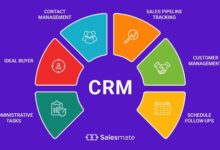AI-Powered CRM Software: Revolutionizing Customer Relationships With AI Technology
AI-Powered CRM Software brings a new wave of innovation to customer relationship management, seamlessly blending artificial intelligence with traditional CRM systems to enhance customer interactions and streamline data processes. As businesses strive to stay ahead in a competitive market, the integration of AI technology offers unparalleled insights and automation capabilities, setting a new standard for customer-centric strategies.
Detailed Explanation of AI-Powered CRM Software Features
AI-powered CRM software leverages artificial intelligence to enhance customer relationship management processes through automation and predictive analysis. By integrating AI algorithms, CRM platforms can improve data processing efficiency and provide valuable customer insights.
Key Features of AI-Powered CRM Software
- Automated lead scoring and prioritization based on behavior analysis.
- Natural language processing for sentiment analysis and personalized communication.
- Predictive analytics for forecasting sales trends and customer behavior.
- Chatbots for instant customer support and engagement.
Utilization of AI in CRM Systems
AI is utilized in CRM systems for automation by streamlining repetitive tasks such as data entry, lead nurturing, and email marketing. Predictive analysis helps in identifying patterns and trends within customer data, enabling businesses to make data-driven decisions for targeted marketing campaigns and personalized customer experiences.
Integration of AI Algorithms in CRM Platforms
AI algorithms are integrated into CRM platforms to enhance data processing capabilities, enabling real-time data analysis, predictive modeling, and customer segmentation. By analyzing large volumes of data, AI algorithms can provide valuable insights into customer preferences, behavior patterns, and potential sales opportunities.
Key Features of AI-Powered CRM Software
AI-powered CRM software offers a range of advanced features that revolutionize customer relationship management. By leveraging artificial intelligence, these systems provide businesses with enhanced capabilities to streamline processes, improve customer interactions, and optimize data management.
Comparison between Traditional CRM and AI-Powered CRM
Traditional CRM software relies on manual data entry and basic automation tools, whereas AI-powered CRM solutions utilize machine learning algorithms to automate repetitive tasks, analyze customer data, and provide predictive insights for personalized customer interactions.
Enhanced Customer Interactions and Data Management
AI features in CRM software enable businesses to deliver personalized customer experiences by analyzing customer behavior, preferences, and interactions. By automating data entry and analysis, AI-powered CRM systems help businesses make data-driven decisions and improve overall customer satisfaction.
Role of AI in Predictive Analytics for Sales Forecasting
AI-powered CRM software utilizes predictive analytics to forecast sales trends, identify potential leads, and optimize sales strategies. Machine learning algorithms analyze historical data to predict future outcomes, helping businesses make informed decisions and maximize sales opportunities.
Machine Learning Algorithms in AI-Powered CRM
AI-powered CRM software employs various machine learning algorithms such as decision trees, neural networks, and clustering algorithms to analyze customer data, segment customers based on behavior, and predict future outcomes. These algorithms enable businesses to tailor their marketing strategies and enhance customer engagement.
Natural Language Processing (NLP) for Customer Support
NLP technology in AI-powered CRM systems enables businesses to analyze customer queries, understand sentiment, and provide timely and relevant responses. By automating customer support processes, NLP enhances efficiency, improves response times, and enhances overall customer satisfaction.
Impact of AI on Personalization and Segmentation
AI-powered CRM software enables businesses to personalize marketing campaigns, offers, and communication based on customer preferences and behavior. By segmenting customers into specific groups, businesses can target their messaging effectively, improve customer engagement, and ultimately drive sales.
Implementation of AI in CRM Systems
AI integration in CRM systems involves a series of steps to leverage the power of artificial intelligence for enhancing customer relationships and business operations. Key considerations include data quality, privacy regulations, and the need for continuous monitoring to ensure optimal performance.
AI Algorithms in CRM Systems
- Machine Learning Models: AI algorithms like clustering and classification are commonly used for customer segmentation, predicting customer behavior, and recommending personalized offers.
- Natural Language Processing (NLP): NLP algorithms enable sentiment analysis of customer interactions, helping businesses understand customer emotions and feedback.
- Reinforcement Learning: This AI approach is used to optimize decision-making processes within CRM systems, such as determining the best next actions for engaging with customers.
Ethical Implications of AI in CRM
- Privacy Concerns: Ensuring customer data protection and compliance with regulations like GDPR is crucial in AI-powered CRM systems.
- Transparency and Accountability: Businesses must be transparent about how AI is used in CRM to build trust with customers and maintain ethical standards.
- Fairness and Bias: Addressing biases in AI algorithms to prevent discrimination and ensuring fair treatment of all customers is essential.
Benefits of AI in CRM
- Improved Customer Service: AI enables faster response times, personalized interactions, and proactive customer support, enhancing overall service quality.
- Enhanced Personalization: AI algorithms analyze customer data to provide tailored recommendations, offers, and communication, leading to higher customer satisfaction and loyalty.
- Efficiency and Productivity: Automation of repetitive tasks and data processing in CRM systems through AI leads to increased efficiency, allowing employees to focus on high-value activities.
Personalization and Customer Segmentation
Personalization and customer segmentation are crucial aspects of CRM that can significantly impact customer satisfaction and loyalty. AI-powered CRM software plays a key role in enabling personalized customer experiences by leveraging data insights and automation capabilities.
Enabling Personalized Customer Experiences
AI-powered CRM software utilizes machine learning algorithms to analyze customer data and behavior, allowing businesses to tailor their interactions with customers based on individual preferences and past interactions. By understanding customer preferences, businesses can deliver personalized product recommendations, targeted marketing campaigns, and customized communication strategies. This results in a more engaging and relevant customer experience, ultimately leading to increased customer satisfaction and loyalty.
- AI helps in predicting customer behavior and preferences based on historical data, enabling businesses to anticipate their needs and offer personalized recommendations.
- Automated personalized messaging allows businesses to engage with customers at the right time and through the right channel, enhancing the overall customer experience.
- Dynamic content generation based on customer profiles and interactions ensures that each customer receives tailored communication that resonates with their interests.
Role of AI in Customer Segmentation and Targeting
AI plays a crucial role in customer segmentation by analyzing large volumes of data to identify patterns and trends among different customer groups. By segmenting customers based on demographics, behavior, and preferences, businesses can target their marketing efforts more effectively and tailor their offerings to meet specific customer needs.
- AI algorithms can automatically segment customers into distinct groups based on various criteria, allowing businesses to create targeted marketing campaigns for each segment.
- Machine learning models help in predicting customer lifetime value and identifying high-value customers for personalized marketing strategies.
- Real-time data analysis enables businesses to adjust their segmentation strategies on the fly, ensuring that they are always targeting the right audience with the right message.
Examples of Successful Personalization Strategies
Many companies have successfully implemented AI-powered CRM software to drive personalized customer experiences. For example, e-commerce giant Amazon uses AI algorithms to analyze customer browsing and purchase history to provide personalized product recommendations. Netflix leverages AI to recommend movies and TV shows based on user preferences, leading to increased user engagement and retention. Starbucks uses AI-powered CRM to personalize marketing offers and promotions for its loyalty program members, resulting in higher customer satisfaction and loyalty.
- Amazon’s personalized recommendation engine has been shown to increase sales by up to 30% by presenting customers with products that align with their interests and preferences.
- Netflix’s recommendation system, powered by AI, has been credited with reducing customer churn rates and increasing user engagement by suggesting content that users are more likely to enjoy.
- Starbucks’ personalized marketing campaigns have led to a 10% increase in customer spending among loyalty program members, demonstrating the effectiveness of personalized offers in driving customer loyalty and retention.
Data Analytics and Insights
Data analytics and insights play a crucial role in enhancing customer relationship management (CRM) systems. With the integration of AI technology, businesses can leverage advanced algorithms to process and analyze large volumes of customer data with unprecedented speed and accuracy.
Enhanced Data Processing with AI
AI algorithms are designed to handle vast amounts of data, making them ideal for processing the wealth of customer information stored in CRM systems. Unlike traditional methods that rely on manual input and analysis, AI-powered analytics can quickly identify patterns, trends, and correlations within the data, providing valuable insights in real-time.
- AI algorithms can sift through massive datasets to identify customer behaviors, preferences, and interactions, enabling businesses to tailor their marketing strategies and customer engagement efforts accordingly.
- By automating the data analysis process, AI eliminates the risk of human error and ensures a more accurate and consistent interpretation of customer information.
- The speed at which AI algorithms can process data allows businesses to respond to customer needs and market trends promptly, staying ahead of the competition in today’s fast-paced business environment.
Strategic Decision-Making with AI Insights
AI-generated insights provide a deeper understanding of customer behavior and preferences, empowering businesses to make informed decisions that drive growth and profitability. These insights can uncover hidden patterns and correlations that may not be immediately apparent through manual analysis, giving businesses a competitive edge in the market.
AI insights enable businesses to predict customer needs, personalize interactions, and optimize marketing campaigns for maximum effectiveness.
- By leveraging AI analytics in CRM, businesses can identify high-value customers, anticipate churn risks, and tailor their offerings to meet individual customer needs, leading to increased customer satisfaction and loyalty.
- AI insights also enable businesses to forecast market trends, identify new opportunities, and optimize resource allocation for better strategic planning and decision-making.
- Through continuous analysis and interpretation of data, businesses can stay agile and adaptive in response to changing market dynamics, driving long-term success and growth.
Leveraging AI Analytics in CRM
To extract actionable insights from AI analytics in CRM, businesses can follow a step-by-step process to set up AI models, train them with relevant data, and interpret the results for strategic decision-making.
- Identify key business objectives and define the specific insights needed to achieve them.
- Collect and clean relevant customer data to ensure accuracy and consistency in the analysis process.
- Choose the right AI algorithms based on the desired outcomes and train the models using the prepared data sets.
- Monitor the AI models’ performance, validate the results against business objectives, and refine the models as needed to improve accuracy and relevance.
- Interpret the insights generated by AI analytics to make informed decisions, optimize business processes, and enhance customer relationships effectively.
Automation and Workflow Optimization
Automation plays a crucial role in optimizing workflows within CRM systems, particularly with the integration of AI technology. By automating repetitive tasks, AI-powered CRM software streamlines processes, enhances efficiency, and allows employees to focus on more strategic activities.
AI Automation in CRM Processes
- AI automates data entry and updates, reducing manual errors and ensuring data accuracy.
- Automated lead scoring and routing help sales teams prioritize leads and follow up effectively.
- Chatbots powered by AI can handle customer inquiries and support requests, freeing up human agents for more complex issues.
Impact of Automation on Workflow Optimization
- Automation boosts productivity by eliminating time-consuming manual tasks, increasing the speed of operations.
- Workflow optimization through automation leads to quicker response times, improving customer satisfaction and loyalty.
- AI-driven automation enhances decision-making by providing real-time insights and recommendations based on data analysis.
Case Studies on Efficiency through AI Automation
Company X implemented AI-powered CRM software to automate lead scoring and routing. As a result, the sales team increased their conversion rates by 20% within the first quarter.
Organization Y integrated AI chatbots to handle customer inquiries. This led to a 30% reduction in response times and a 15% increase in customer satisfaction scores.
Integration with Other Business Systems
AI-powered CRM software offers seamless integration with various other business systems to enhance data flow and analysis. This integration enables businesses to streamline operations and improve overall efficiency.
Benefits of Seamless Integration
- Improved Data Accuracy: By integrating CRM software with other systems such as ERP or marketing automation tools, businesses can ensure that data is consistent across all platforms.
- Enhanced Customer Insights: Integrating CRM with data analytics tools allows businesses to gain a deeper understanding of customer behavior and preferences.
- Efficient Workflow Management: Integration with project management systems helps in automating tasks and streamlining processes, leading to increased productivity.
Examples of Cross-Platform Integration
- Integration with Email Marketing Platforms: AI-powered CRM software can be integrated with email marketing tools like MailChimp or Constant Contact to personalize email campaigns based on customer data stored in the CRM system.
- Integration with E-commerce Platforms: By integrating CRM with e-commerce platforms such as Shopify or Magento, businesses can track customer interactions across multiple channels and provide a seamless shopping experience.
- Integration with Help Desk Software: Integrating CRM with help desk software like Zendesk or Freshdesk enables businesses to provide personalized customer support based on past interactions and purchase history.
Customer Service and Support
AI technology has revolutionized customer service and support in CRM systems, providing businesses with innovative ways to enhance customer interactions and satisfaction. By leveraging AI capabilities, companies can streamline their support processes, personalize customer experiences, and improve overall efficiency.
AI Chatbots and Virtual Assistants
AI-powered chatbots and virtual assistants play a crucial role in customer service by providing instant responses to queries, resolving issues, and offering 24/7 support. These intelligent systems use natural language processing and machine learning algorithms to understand customer inquiries, engage in conversations, and provide relevant information in real-time. By automating routine tasks and handling basic customer inquiries, AI chatbots free up human agents to focus on more complex issues, leading to faster response times and improved customer satisfaction.
- AI chatbots can be integrated into various communication channels, such as websites, messaging platforms, and mobile apps, to engage with customers wherever they are.
- Virtual assistants powered by AI technology can assist customers with product recommendations, order tracking, troubleshooting, and more, offering a personalized and interactive experience.
- Best practices for implementing AI chatbots include training the system with accurate and up-to-date information, monitoring performance metrics to identify areas for improvement, and continuously refining the chatbot’s responses based on customer feedback.
Security and Data Privacy
In the realm of AI-powered CRM systems, security and data privacy are paramount concerns that must be addressed to ensure the trust and confidence of both customers and businesses.
Importance of Security Measures
Implementing robust security measures in AI-powered CRM systems is crucial to safeguard sensitive customer data from cyber threats and unauthorized access. By utilizing encryption techniques, access controls, and regular security audits, businesses can mitigate the risk of data breaches and ensure the confidentiality and integrity of customer information.
How AI Enhances Data Privacy and Compliance
AI technology plays a significant role in enhancing data privacy and compliance within CRM systems. Machine learning algorithms can detect unusual patterns in data access and usage, enabling proactive monitoring and detection of security threats. Additionally, AI-powered anomaly detection can identify potential data breaches or unauthorized activities, helping businesses maintain compliance with data privacy regulations.
Examples of AI Safeguarding Customer Data in CRM
- AI-driven encryption: Advanced encryption algorithms powered by AI can protect customer data at rest and in transit, ensuring that sensitive information remains secure.
- Behavioral biometrics: AI can analyze user behavior patterns to create unique profiles, enabling secure authentication and access control based on individual characteristics.
- Predictive analytics: AI algorithms can anticipate security risks and recommend proactive measures to prevent data breaches, enhancing overall data protection in CRM systems.
Scalability and Flexibility
The scalability and flexibility of AI-powered CRM software play a crucial role in meeting the evolving needs of businesses as they grow and adapt to changing market dynamics. Let’s delve deeper into how AI systems can scale with business growth and provide the necessary flexibility to adjust to shifting requirements.
Scalability with Business Growth
AI-powered CRM software offers scalability by efficiently handling a growing volume of data, customer interactions, and business processes as the organization expands. The system can easily accommodate an increasing number of users, customers, and transactions without compromising performance.
Flexibility to Adapt
AI systems in CRM software are designed to be flexible, allowing businesses to customize and tailor the solution according to their unique requirements. This adaptability enables organizations to incorporate new features, functionalities, and integrations as needed, ensuring that the CRM system remains aligned with changing business objectives.
Benefits of Scalable AI CRM Solutions
- Improved operational efficiency and productivity
- Enhanced customer experience through personalized interactions
- Streamlined processes and workflows for better decision-making
- Scalable infrastructure that grows with the business
Assessing Scalability Needs
Before implementing AI CRM software, businesses should conduct a thorough assessment of their scalability requirements. This involves evaluating factors such as current data volume, expected growth rate, user capacity, and integration capabilities to ensure that the chosen CRM solution can scale effectively.
Scalability Features Comparison Table
| CRM Software Provider | Scalability Features |
|---|---|
| Provider A | Advanced data processing capabilities for scalability |
| Provider B | Scalable cloud infrastructure with flexible pricing options |
| Provider C | Customizable modules for tailored scalability solutions |
Customizing AI CRM Systems for Scalability
Businesses can customize AI CRM systems to meet their unique scalability requirements by collaborating with the software provider to implement tailored solutions. This customization may involve developing specific features, integrations, or workflows that align with the organization’s growth trajectory and operational needs.
User Experience and Interface Design
User experience (UX) and interface design play a crucial role in the success of CRM platforms. AI has revolutionized the way users interact with CRM systems, enhancing usability and overall satisfaction.
Role of AI in Enhancing User Experience
AI in CRM platforms improves user experience by analyzing user behavior and preferences to personalize interactions. By leveraging AI algorithms, CRM systems can anticipate user needs, streamline processes, and provide proactive assistance.
- AI-driven recommendations based on previous interactions
- Automated data entry and updates for a seamless user experience
- Intelligent search functionality for quick access to information
AI-Driven Interface Design Improvements
AI-driven design focuses on creating intuitive interfaces that adapt to individual user preferences. By analyzing user interactions in real-time, AI can tailor the interface layout, content, and features to enhance usability and efficiency.
- Dynamic content organization based on user engagement patterns
- Personalized dashboards with relevant metrics and insights
- Adaptive navigation menus for quick access to frequently used tools
Comparison with Traditional Design Approaches
Traditional user interface design relies on static layouts and predefined structures, limiting flexibility and personalization. In contrast, AI-driven design continuously evolves based on user feedback and behavior, creating a more engaging and user-centric experience.
- Static vs. dynamic content presentation
- Manual customization vs. AI-driven personalization
- Fixed vs. adaptive navigation systems
Impact of AI in Creating Intuitive Interfaces
AI enhances user interfaces by predicting user actions, offering tailored suggestions, and optimizing workflows. With AI-driven interfaces, users can navigate complex CRM systems with ease, leading to increased productivity and user satisfaction.
- Smart automation of repetitive tasks for a seamless user experience
- Context-aware recommendations for relevant actions and insights
- Real-time feedback integration for continuous interface improvement
Industry Applications and Case Studies
AI-powered CRM software has found widespread applications across various industries, revolutionizing customer engagement strategies and optimizing business processes. Let’s explore some industry-specific applications and case studies showcasing the successful implementation of AI CRM solutions.
Telecommunications Industry
AI-powered CRM software has transformed customer engagement strategies in the telecommunications industry by enabling personalized interactions and targeted marketing campaigns. By analyzing customer data and behaviors, telecom companies can proactively address customer needs and preferences, leading to improved customer satisfaction and loyalty.
E-commerce Businesses
In the e-commerce sector, AI CRM solutions play a crucial role in enhancing personalized marketing campaigns. By leveraging AI algorithms to analyze customer data, e-commerce businesses can create targeted promotions, recommend products based on individual preferences, and provide a seamless shopping experience, ultimately increasing sales and customer retention.
Automotive Industry
AI-powered CRM software is optimizing sales processes in the automotive industry by automating lead management, predicting customer preferences, and personalizing the sales experience. By streamlining sales workflows and providing real-time insights, AI CRM solutions help automotive companies close deals faster and improve overall sales performance.
Hospitality Sector
In the hospitality sector, AI CRM solutions have improved customer service efficiency by enabling personalized guest interactions, managing reservations, and anticipating guest needs. By analyzing guest data and feedback, hotels and resorts can enhance the overall guest experience, drive repeat business, and build long-term customer relationships.
Healthcare Industry
AI CRM software is streamlining patient care processes in the healthcare industry by integrating patient data, automating appointment scheduling, and providing personalized health recommendations. By leveraging AI algorithms to analyze patient information, healthcare providers can deliver more efficient and personalized care, leading to better patient outcomes and satisfaction.
Financial Services Sector
AI CRM solutions are increasing customer retention rates in the financial services sector by offering personalized financial advice, tailored product recommendations, and proactive customer support. By analyzing customer behavior and financial patterns, financial institutions can better understand customer needs and preferences, ultimately fostering stronger customer relationships and loyalty.
Real Estate Industry
AI-powered CRM software has transformed lead generation tactics in the real estate industry by analyzing market trends, predicting buyer preferences, and automating lead nurturing processes. By providing real-time insights and personalized property recommendations, real estate agents can improve lead conversion rates and drive business growth.
Retail Sector
AI CRM solutions have enhanced customer satisfaction in the retail sector by enabling personalized shopping experiences, targeted promotions, and seamless omnichannel interactions. By analyzing customer data and behaviors, retailers can deliver relevant product recommendations, optimize inventory management, and create loyalty programs that resonate with customers.
Manufacturing Industry
Implementing AI CRM solutions in the manufacturing industry presents both challenges and opportunities, from streamlining supply chain operations to enhancing customer relationships. By integrating AI algorithms into CRM systems, manufacturers can improve demand forecasting, optimize production schedules, and enhance customer service, ultimately driving operational efficiency and business growth.
Future Trends and Developments
AI-powered CRM technology is constantly evolving, and there are several emerging trends that are shaping the future of customer relationship management. As businesses continue to adopt AI solutions to enhance customer interactions and streamline processes, it is essential to explore the potential advancements in AI for CRM and how they will impact the industry in the coming years.
Integration of AI with Voice Assistants
With the rising popularity of voice assistants like Siri, Alexa, and Google Assistant, integrating AI capabilities with CRM systems is becoming a major trend. This development allows users to interact with CRM platforms using voice commands, making it easier to access information, schedule tasks, and analyze data hands-free. By leveraging voice technology, businesses can improve efficiency and provide a more seamless user experience.
AI-Powered Predictive Analytics
One of the key future developments in AI for CRM is the use of predictive analytics to anticipate customer behavior and preferences. By analyzing large volumes of data using machine learning algorithms, AI-powered CRM systems can predict future trends, identify potential opportunities, and personalize marketing campaigns. This proactive approach enables businesses to make data-driven decisions and stay ahead of competitors in a rapidly changing market.
Enhanced Personalization through AI
As AI technology continues to advance, we can expect to see even greater levels of personalization in CRM systems. By leveraging AI algorithms to analyze customer data and behavior patterns, businesses can create highly tailored experiences for individual customers. From personalized product recommendations to targeted marketing messages, AI-powered CRM software will enable businesses to build stronger relationships with their customers and drive customer loyalty.
Selection Criteria and Implementation Strategies
When selecting AI-powered CRM software, organizations should consider key factors to ensure a successful implementation and adoption of AI in CRM systems. Implementing AI in CRM requires careful planning and strategic execution to maximize its benefits. Here is a guide to help organizations integrate AI into their CRM systems effectively.
Key Factors for Selection of AI-powered CRM Software
- Compatibility and Integration: Choose a CRM software that seamlessly integrates with existing systems and tools within the organization to ensure smooth operations.
- Scalability: Opt for a solution that can scale with the growth of the organization and accommodate increasing data and user requirements.
- User-Friendly Interface: Select a CRM software with an intuitive interface that is easy for employees to navigate and utilize effectively.
- Data Security: Prioritize data security and choose a CRM software that complies with industry standards and regulations to protect sensitive customer information.
- Customization Options: Look for AI-powered CRM software that offers customization options to tailor the system to meet the specific needs and requirements of the organization.
Strategies for Successful Implementation and Adoption of AI in CRM
- Clear Objectives: Define clear objectives and goals for implementing AI in CRM to ensure alignment with the overall business strategy.
- Employee Training: Provide comprehensive training to employees to familiarize them with the AI-powered CRM system and ensure successful adoption.
- Change Management: Implement effective change management strategies to address any resistance to adopting AI in CRM and promote a culture of innovation within the organization.
- Data Quality: Ensure the quality of data used in the AI-powered CRM system is accurate and reliable to generate meaningful insights and drive informed decision-making.
- Continuous Monitoring and Evaluation: Regularly monitor and evaluate the performance of the AI-powered CRM system to identify areas for improvement and optimization.
Guide for Integrating AI into CRM Systems
- Assess Organizational Needs: Conduct a thorough assessment of organizational needs and requirements to determine the type of AI capabilities that will best serve the organization.
- Select the Right AI Tools: Choose AI tools and technologies that align with the goals and objectives of the organization and have proven success in CRM applications.
- Pilot Testing: Conduct pilot testing of the AI-powered CRM system with a small group of users to evaluate its effectiveness and identify any potential issues before full implementation.
- Iterative Implementation: Implement AI in CRM in stages, allowing for iterative improvements and adjustments based on user feedback and performance metrics.
- Measure ROI: Measure the return on investment (ROI) of integrating AI into CRM systems by tracking key performance indicators and assessing the impact on business outcomes.
Last Recap
In conclusion, AI-Powered CRM Software is not just a tool but a transformative force in shaping the future of customer relationships. By leveraging the power of AI algorithms, businesses can unlock a wealth of opportunities for personalized experiences, data-driven insights, and streamlined processes, ultimately driving growth and success in the digital age.




